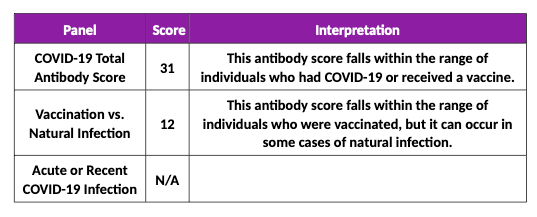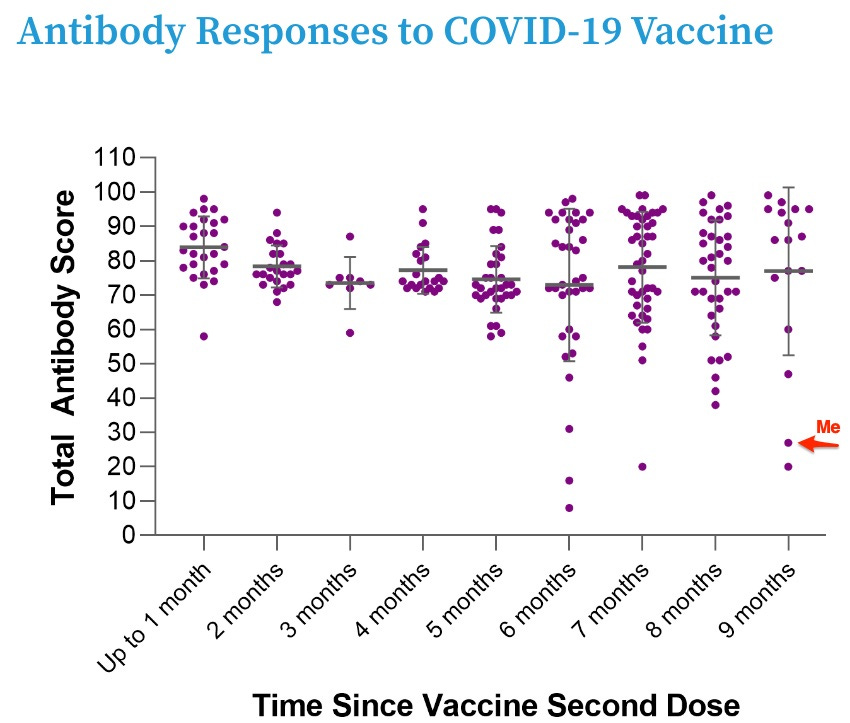Personal Science Week - 19 Jan 2023
Revisiting my Serimmune COVID antibody test result, plus other ideas of interest
This is a weekly newsletter for Personal Scientists, published each Thursday for anyone who wants to apply the tools of science for personal reasons (to solve a problem) rather than professional ones (for a job). Following the motto of the Royal Society, established in 1660, nullius in verba, we take nobody’s word for it. In Personal Science, you have to test it for yourself.
In this issue we revisit COVID antibody testing, with an updated new test result.
As long-time Personal Science Week readers know, I’ve been participating in a five-year clinical trial from Serimmune, a California-based startup developing technologies for “immune intelligence”, a simple at-home blood test intended to uncover a person’s antibody levels for dozens of diseases, including tick-borne diseases like Lyme as well as COVID-19. (Read my previous experience with the test in our October 2022 summary).
Well, now I’ve received a fresh update — my third test, from a Dec 2022 sample — and the results are … well, I’m unsure what to think. Here’s the key summary:
My COVID-19 antibodies have dropped considerably in the past six months, down from my 52 score in June 2022. More disturbingly (if that’s the right word), I’m showing a significantly lower response at the key spike protein that is the target of the vaccines. (Click here to see complete PDF copies of my raw reports)
The company publishes a wealth of data about its clinical trial results so far, including this chart. Participant data is kept strictly anonymous, of course, but here’s where I fit among the others:
As you can see, I appear to have much lower antibodies than the others in the trial. Does this make me more likely to get COVID?
You might think so, except for the odd fact that after three years, I’ve not had COVID or any other respiratory symptoms. Not even a sniffle. This, despite my taking no special precautions: I’ve traveled regularly, domestically as well as internationally, attended many large public events plus my uninterrupted and regular large indoor family get-togethers, including with unvaccinated people. This is not to minimize the seriousness the pandemic has caused to many others (including close family members who became very sick), but the Personal Science skeptic in me is reminded how little anyone knows about disease. And of course I could become deathly sick tomorrow. Who knows.
Incidentally, although the Serimmune clinical trial is technically no longer recruiting new subjects, they told me they still have a few spots left: click here to apply. And be sure to let us know when you receive your results.
Other Personal Science Ideas of Interest
Dominant Assurance Contracts might be an interesting way to fund small-scale personal science research. Let’s say you need $500 in materials to conduct a small study. Post an announcement that you will give $55 to the first ten people who send you $50 — unless more than ten people send money, in which case all the proceeds will go toward your research project. This way, the most you’ll be out is 10 x $5 = $50, but once the 11th person signs up you’ll be 11 x $50 = $550 ahead. I have no idea what legal implications are involved, if any, but for small-scale projects this would be much easier than running a full-blown campaign on Kickstarter.
Lucid Dreaming and Out-of-Body Experiences: a website with free eBooks that explain how to train yourself to leave your body and enter another world. The book claims more than 50% of people who follow the simple instructions will escape their bodies within 3 days (90% within two weeks). The general idea is to set your alarm clock to wake you up when you’re half-asleep and then focus on some simple mental exercises. I’ve not tried it (yet) but at least one person I respect says it works and the effect is incredible.
Self-tracking and the origin of science. Louis Liebenberg, of Cybertracker.org thinks the principles of science were invented by prehistoric hunters who learned to track game animals through persistence hunting — essentially, slow and steady running until the prey falls down through exhaustion. Liebenberg’s ideas and books have been endorsed by Harvard professors including Steven Pinker and Biologist Daniel Lieberman. It’s a fascinating and unconventional way to look at science, with many ideas applicable to Personal Scientists.
About Personal Science
The word “science” in everyday conversation is often mistakenly used as a synonym for “truth”, a regrettable confusion that often discredits all scientists when an overhyped finding is later shown to be false. Similarly, many people say “science” when really they are simply expressing wonder at beautiful aspects of the physical world. Personal Scientists, by contrast, treat science as a verb: something you do rather than passively appreciate.
This newsletter is a brief summary published for people who want to do science for personal reasons, rather than as a job. Please leave a comment if you have questions or suggestions that can benefit other Personal Scientists.


